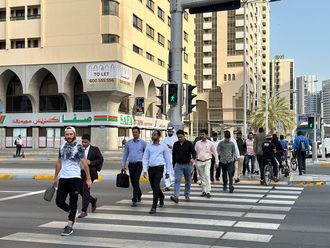Dubai: Higher temperature, rising sea waters and extreme weather conditions due to climate change in years to come will have adverse health effects on UAE residents, an ongoing health risk assessment by the Ministry of Climate Change and Environment has found.
In its early stages, the study into human health is part of a sweeping effort by the UAE to be fully prepared for the impacts of increasing greenhouse gas temperatures and the ensuing fallout from global warming, heard delegates attending the Global Climate Change Conference hosted at Canadian University of Dubai in partnership with the University of Prince Edward Island in Canada on Monday.
Thani Ahmad Al Zeyoudi, Minister of Climate Change and Environment, said in his opening remarks to the three-day conference that health effects are critical to understand through study to stave off unwanted illness in times ahead.
“On climate adaptation, we launched the National Climate Change Adaptation Programme in September 2017. We have identified health, energy, infrastructure and environment sectors as the first set of priority sectors, and have embarked on a systematic process to identify risks and mitigation options based on internationally recognised tools and practices and in close cooperation with relevant stakeholders,” Al Zeyoudi said.
“The first step is to identify projected changes in climate trends such as changes in temperature, humidity, sea level rise and extreme weather events, followed by an impact assessment of those changes to a given sector on economic, social and environmental dimensions using a comprehensive risk assessment framework. Once the identified risks are prioritised, then measures to mitigate the risks will be developed and implemented,” Al Zeyoudi said. “Currently, we are focusing on the health sector, which globally has yet to be monitored extensively from a climate change point of view, although heat stress and diseases are increasingly climate-related health concerns.”
In her presentation, Mashael Al Ansari, climate change specialist with the ministry said, several areas of health impacts are being studies including demand for water and electricity “due to increased temperatures and humidity” to “reduced seawater quality due to increase water temperature and acidity.”
Al Ansari said study so far suggests that the UAE may see “lost productivity and higher health costs due to increased stress, allergies and infectious diseases.”
Speaker Dr Dan Scott noted that tourism in the region could also suffer setbacks from climate change despite projected growth in passenger travel from four billion air travellers in 2016 to 7.8 billion by 2036.
“Tourism represents about 10 per cent of global GDP,” he said, noting that number is expected to increase to 11.4 per cent by 2027.
That said, Scott cited a United Nations warning that “climate change must be considered the greatest challenge to global tourism.”
“The very assets that bring people to different parts of the world will be affected as well,” Scott noted.












